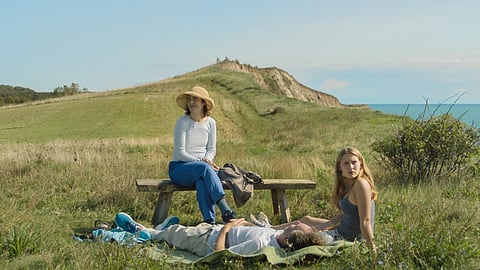

Grief is often thought of as a rather simple, uncomplicated emotion. What more can there be to sorrow after all than a few tears? My Eternal Summer, the Danish film that had its world premiere recently in the New Directors segment of the San Sebastian Film Festival, delves into the hidden depths and complexities of the anguish of loss. What’s more, there’s an added layer of the vital contradictions governing life—the world opening up for teenage Fanny (Kaya Toft Loholt), just when a formative presence in her life is about to bid her final farewell. Sylvia Le Fanu’s debut feature film is a candid, relatable and tender tale of coming of age in the midst of bereavement, mourning and pain.
On the surface, nothing much appears to happen in the film. Fanny and her parents, Karin (Maria Rossing) and Johan (Anders Mossling), drive down to their summer house and get busy with the usual things—rest and relaxation, reading and swimming, walks and picnics. However, beneath the comfort of the familiar routine of life lies the certitude of mortality—that it’d be Karin’s last summer. As the family spends time together, living in the moment and making cherished intimate memories for a future devoid of Karin, Fanu explores the inevitability of death and anticipated grief. And, more than that, she dwells on the gradual process of reconciliation and healing that gets initiated—though not entirely successfully—even before the eventual absence of a loved one.
In that sense, unlike most films dealing with death, My Eternal Summer is not about the one who is dying but those she leaves behind. The young director looks at how relationships get shaped and reconfigured with death lurking in the corners and how an impending tragedy moulds the family dynamics. Fanu’s style is marked by a distinct delicacy even when she mines the ugly and unpalatable emotions. Such as the lack of communication and broken connection between the father and the daughter. “You never ask me how I feel,” says Fanny to Johan, both of them like silent, isolated islands in a shared sea of sorrow and suffering. What might appear on paper to be the stuff of heavy morbidity is underlined with an unusually light, melancholic touch. Fanu is never manipulative and not once does she give in to excesses when it comes to sentiments. In fact, in the middle of all the anguish, there is gentle humour, lyrical interludes and musical punctuations.
The soulful writing finds a matching rhythm in all aspects of filmmaking—be it the shot-taking and editing, the sound or production design. There is a languidness and lilt that suffuses the film. The performances are mellifluous in intonation, especially the depth and layers in Kaya’s interpretation of Fanny. One minute complaining about boredom, the next minute out with her friends, one second shedding tears for her mother in the presence of her boyfriend Jamie, the next having a fight with him.
The family of three feels real, as do their emotions, individual and collective. There are moments that feel so lived in that they break your heart. Like Fanny confessing that she doesn’t want to be left alone with her ailing mother. A few words are enough to articulate her fear of having to face her death alone or her praying to God to heal her, promising to be a good daughter in return.
One of the most remarkably performed and beautifully realised scenes at the movies this year, and my takeaway moment from My Eternal Summer is of the mother and daughter laughing uncontrollably and crying just as copiously while watching a game together. It is emblematic of the film at large—a poignant and profound meditation on the fragility of life and dignity in death and the one that upholds the ultimate truth about having to let go of the ones we hold the most dear.